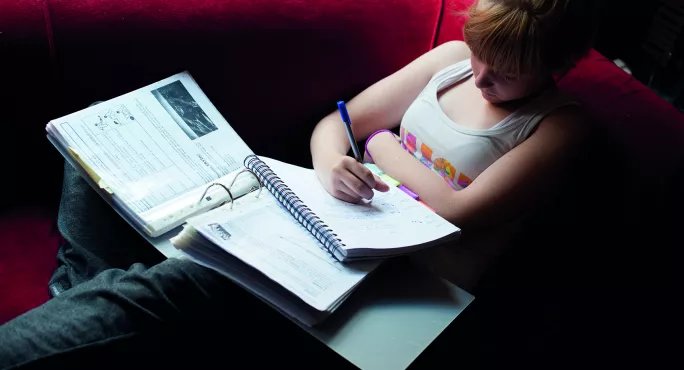- Home
- Revision technique is about quality, not quantity
Revision technique is about quality, not quantity

The run-up to exam season is a tense time, with students and teachers clocking up extra hours as the revision timetable takes hold.
But do these extra hours have an impact?
Could a more effective revision technique mean fewer hours studying, making the looming A levels, GCSEs or Sats a less daunting prospect?
As teachers, we put on a plethora of revision classes to ensure students revise and that they do so properly.
But what exactly is good-quality revision? And in our efforts to ensure that students revise well, are we in danger of perpetuating the myth that the more you revise, the better the end result?
Poor revision technique
The proof that teens do not revise well is pretty conclusive. Research by Bjork, Dunlosky and Kornell (2012) found that students don’t like to use the most effective revision techniques, such as self-testing (they don’t think it aids their learning), using flashcards and quizzing.
Not only that but they routinely use less effective revision techniques, such as re-reading their class books and highlighting their notes.
They then tend to apply these ineffective techniques over long periods. They clock up hours of revision in the belief that time spent equates to exam success but, actually, a lot of it is simply wasted.
So, how do we help students to revise better and how do we help them to understand that more revision is not always beneficial?
Focus on weaker areas
Anders Ericsson is a professor of psychology at Florida State University and has studied expertise for decades, including research on how students should revise and for how long.
What we need to aim for, he says, is “deliberate practice”.
He defines deliberate practice as work, not performance; so it is concentration on a specific element and repeatedly practising that element under guidance rather than concentrating on improving an end result.
So, rather than building your football skills by playing as many matches as possible with your mates, you should be coached to identify your weak areas (for example, a poor left-footed pass) and on how to improve that (the creation of repeated drills to improve that left foot).
If we transfer this to revision, then we need to be much more specific about how we set - and how teenagers set their own - revision. So, rather than simply “revising physics”, we need to target a specific area of the subject, such as “waves”.
We should get students to construct a mind map of prior knowledge of the topic and test themselves on that knowledge, generating feedback as to where the weak areas are so they can be targeted.
The role of the teacher in this process cannot be underestimated. Teenagers won’t know to use this revision technique unless you explicitly tell them. And they won’t always be adept at spotting their weaknesses or devising ways to tackle those weaknesses.
How much to revise? And when?
Under the pressure of looming exams, there is an understandable urge to work harder and harder. It makes sense to us that the more we revise, the more knowledge we will cram into our brains and the better we will perform in an exam.
But it turns out that this is wrong. Ericsson’s research on expert performance has found that experts in all fields, from music to sport and academia, spent similar amounts of time on deliberate practice, but it was fewer hours than almost everybody assumed.
Although these experts usually began their practice at an early age and maintained high levels of daily practice, they limited it to between two and four hours a day.
The key to effective revision is not hours of cramming in the final few months before an exam but regular, concentrated-but-shorter periods of revision.
This works against how most schools operate. The after-school revision sessions are particularly problematic. After a hard-thinking five hours, the teenage brain simply isn’t ready for peak performance.
Revision sessions should be little and often
We should target regular deliberate practice in schools, and it makes sense for that daily dose of revision to be in registration time, which lasts around 15 or 20 minutes in most schools.
We can supplement this with in-lesson revision time and specific guidance on out-of-school revision. We need to plan to ensure maximum use of these sessions.
We know, from more than a century of studying the human brain and its flawed memory, that we need a little forgetting to learn. Cognitive scientists call it “spacing”.
We also know that we should aim for “interleaving”. This term describes the practice of mixing up revision topics, so that the brain is forced to remember and sort the learned material.
Our students are prone to the easy approach of blocking: spending all day on one subject or topic.
Happily, the school day is naturally interleaved, but teacher-led revision sessions, or extra revision days, are prone to focusing in on one subject. We need to ensure that we train students to interleave and space out their revision.
All of this takes a great deal of coordination across subjects and some real leadership across the school. But if we model how it should work in school hours, students will transfer this to their personal revision.
We don’t need students to be spending every waking hour revising, just revising better for shorter periods. By focusing on quality, we may see a welcome reduction in quantity - easing the stress for students and teachers alike - and strike the right balance for our students to achieve exam success.
Alex Quigley is director of research at Huntington School in York
Keep reading for just £1 per month
You've reached your limit of free articles this month. Subscribe for £1 per month for three months and get:
- Unlimited access to all Tes magazine content
- Exclusive subscriber-only stories
- Award-winning email newsletters



